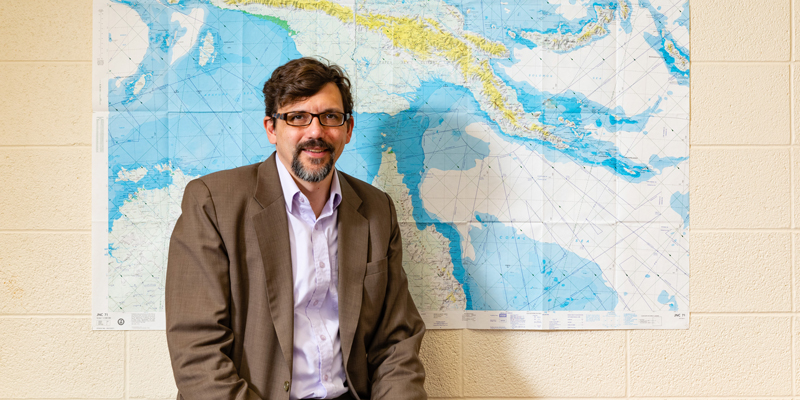George Weiblen shares a few thoughts before giving the keynote speech at the 2019 CBS undergraduate commencement.

When he steps to the podium May 18, it won’t be George Weiblen’s first time addressing a room of soon-to-be graduates. The Plant and Microbial Biology faculty member’s first foray into commencement speeches started somewhat without notice at the Wanang Conservation School last year in Papua New Guinea where he conducts field research. We recently caught up with Weiblen to ask about thoughts on serving as commencement speaker and advice he has for CBS students walking across the stage this spring.
This is not your first commencement speech after giving the graduation speech at Wanang School. How does preparing for this experience differ for you?
Participating in CBS commencement is really different and it’s hard to compare with Papua New Guinea. I was invited to celebrate the first graduating class at the Wanang School but nobody bothered to tell me ahead of time that I'd be giving the speech. It was a surprise to see my name on the program!
How did your career plans change (or not change) from your undergraduate experience to where you are now?
Graduating from college I figured that biology was in my future but I never expected to become a professor who divides his time between Minnesota and a remote island in the South Pacific. I was fortunate to have the opportunity to travel abroad straight out of school. Visiting eight countries over 12 months completely changed my outlook on life. I realized that there are countless opportunities around the world if you are curious, open-minded, and willing to take a few risks. An eye for exotic plants led me to unfamiliar places that ultimately connected me back to a career at home with a greater appreciation for my own backyard.
What's something you wished you knew before finishing your undergraduate degree?
CBS is a great place to develop your critical thinking and realize that some of the biggest questions about life are still out there, unanswered. As a student, there is a lot of pressure to have a plan or to be pointed in some direction but it's just not fair. Nobody can predict the future, especially now that society and the environment are changing faster than ever before in human history. I wish I'd known that it was OK to wander, change course, or simply wait for opportunities that feel right because that's what I ended up doing for two years before continuing my formal education. Maybe college tried to teach me this but I wasn't paying attention at the time.
What are some of the most exciting areas in science and biology to you that new graduates should go explore?
Wow. This is an amazing time to explore new frontiers. Emerging technology and limitless data are changing what biologists do and how we think about science. Artificial intelligence, virtual reality, gene editing, environmental health, climate change, sustainable bioeconomy, bioethics, and the neuroscience of human consciousness just to name a few. Some of these issues may benefit from new discoveries at the lab bench but many will not. Go wherever they take you.